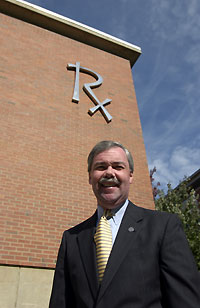|
This is an archived article.
For the latest news, go to the
Advance Homepage
For more archives, go to the Advance Archive/Search Page. | ||
|
McCarthy Named As Pharmacy Dean Robert McCarthy, head of the pharmacy practice department, has been named dean of the School of Pharmacy. McCarthy, who joined the faculty in August 2001, had been serving as interim dean for the past 15 months, while a permanent replacement was sought.
"Within several months, it became apparent that we already had an effective and well-respected leader in place," says John Petersen, provost and executive vice president for academic affairs, who was approached by some faculty members inquiring as to whether McCarthy's appointment could be permanent. The entire pharmacy faculty was then solicited for input, and support for McCarthy was strong. "Robert McCarthy's appointment to the deanship, enthusiastically supported by the School of Pharmacy and this administration, is a testament to his demonstrated success in reacting to and serving the needs of his faculty, staff, and students," Petersen says. McCarthy, the School's seventh dean, welcomes the opportunity to lead the School at a time when the University is undergoing a significant transformation. "I've always considered this position at UConn as one of the top 10 school of pharmacy deanships in the country," he says, "and to have the opportunity to lead this wonderful school is one of the greatest moments in my professional life." McCarthy's career began in Vermont as a hospital pharmacy director. He then served in the same type of position at two Massachusetts hospitals, before joining Northeastern University in 1984 as a clinical assistant professor of pharmacy. Three years later he became a faculty member at the Massachusetts College of Pharmacy and Health Sciences in Boston, where he stayed for 12 years. The role of dean is not new to McCarthy. In 1998, he spent nine months as interim dean at the Massachusetts College of Pharmacy. A year later he was asked to be the founding dean of the college's new School of Pharmacy in Worcester, where he hired new faculty, recruited students, and helped design a new building and a professional curriculum. Since taking over the reins at UConn, McCarthy's primary goals have been to bolster faculty and staff morale and boost the School's reputation. "My duty is to provide the kind of leadership these good people deserve, and promote their exceptional work," he says. "As a dean, you have to get as much pleasure and satisfaction from the successes of your faculty and students as if you had accomplished it yourself." McCarthy is a native New Englander, who passed up positions at several other institutions to stay in the region he loves. He was born in Boston, and at the age of 12, moved with his family to nearby Hull. He is a graduate of Northeastern University's bachelor's and master's programs in pharmacy, and returned there to earn a doctorate in law, policy, and society in 1993. McCarthy's research interests include pharmacy ethics, and health care systems and policy. He has more than two-dozen peer-reviewed publications to his credit. He also co-authored a manual on the design and implementation of managed care pharmacy residency programs, based upon his experience in developing one of the first such programs in the nation. The third edition of his textbook, Introduction to Health Care Delivery: A Primer for Pharmacists, is currently in preparation. In 1999, he received an American Council on Education Fellowship; and the Massachusetts Pharmacists Association presented him with the Nathan Goldberg Award in the same year. This past summer he became chair-elect of the Social and Administrative Sciences Section of the American Association of Colleges of Pharmacy. He also represents pharmacy education on the Healthy People Curriculum Task Force, a national group of health care experts and organizations whose goal is to get health promotion and disease prevention included in the curricula of all health profession schools. |

